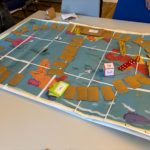Le projet Classcraft Suisse-Brésil a été sélectionné par la Leading House for the Latin American Region (Université de Saint Gall) pour un financement qui permettra de conduire une analyse des usages du jeu au Brésil et en Suisse Romande. Le projet sera conduit en partenariat avec une équipe brésilienne pilotée par Celso Gonçalves professeur au Centro Universitário do Triângulo (Uberlândia, Brazil).

Abstract :
Student behaviour, acceptance of the game, and consequences of teachers’ decisions in the context of a class management game: A comparative study.
The current project will explore to what extent ludicization (i.e. the conversion of an ordinary situation into a ludic, playful situation) promotes positive behaviour in students and supports teachers’ previous decisions. The project will explore connections between specific features of ludicization and students’ positive behaviour. It will focus on students’ appropriation of classroom rules in experiences with Classcraft, a classroom management role playing game used by more than two million players worldwide. This joint study examines the consequences of teachers’ decisions and cultural nuances in both students’ behaviour and teachers’ practices in the context of the use of the game.
This study will use a mixed methodology. Playing analytics from Classcraft will be collected and analysed. An ethnomethodological study will also be conducted in four pilot classrooms in Switzerland and Brazil; this study will monitor student behaviour over an entire semester and collect teacher feedback.
The expected outcomes of the project are:
- The teachers involved in the project will develop concrete experience in the ludicization of learning settings, and they will disseminate the techniques learned throughout their networks.
- An original mixed methodology will be designed for this project; this methodology will then be available for future investigations using larger data sets.
- This study will help explain the connection between ludicization and positive behaviour in students.
This preliminary study is also a starting point for a more ambitious project exploring the concept of ludicization in learning settings and conducted by an enlarged consortium of researchers in Switzerland and Brazil. This larger collaboration will be conducted on a larger sample of schools in Brazil (200) and Switzerland (20).



